Business Application Development
Business application development is a critical process to reach people in this digital era. Learn all about business app development in this article.
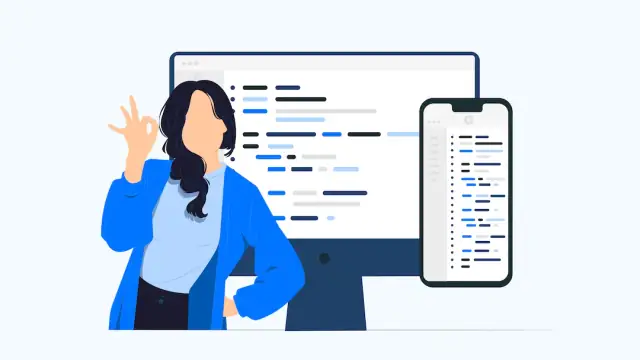
In order to become successful in this digital era, both large and small businesses have to build mobile and web apps to reach their target audience. Otherwise, organizations are always at the risk of getting outsmarted by organizations that use different types of apps to achieve their business goals.
The importance of business software is much greater than simple mobile apps as they are meant to fulfill specific goals. Keep reading to learn all about business applications and the different aspects of developing a business app to ensure maximum customer satisfaction.
What are business applications?
A software program or a group of programs that provide business capabilities are known as business applications. They are also used to raise and keep track of productivity throughout the whole company. Business apps may be used internally, externally, or in conjunction with other business software.
Generally, different departments of an organization use different business apps to achieve their business objectives. However, having a common enterprise system is also common for large organizations. Business software can be bought as ready-made solutions or constructed on-site. Business requirements and financial constraints determine the kind of software it will use.
Types of business apps
Following are the three major types of business apps:
Business to Business (B2B) Apps
Apps used by business partners, such as distributors and suppliers, are B2B apps. Dedicated lines may be used to access them, for example, the package submission web service.
Business to Customer (B2C) Apps
General-purpose applications apps is B2C apps. Most of them are web- and browser-based, such as dynamic content websites, e-commerce apps, customer loyalty apps, etc.
Business-Specific Apps
Apps utilized inside the company are called internal or specific business apps. These are essential apps for business functionality, including internal ERP systems, HR systems, etc.
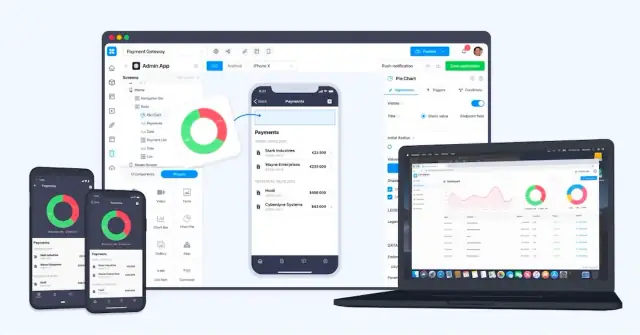
Other than these major types of business software, they can also be categorized into:
- Front-end business software in which business users directly interact with the app through the interface.
- Back-end business apps in which most of the app processes are performed in the background.
- Services-based apps in which apps serve as an integration platform for various systems.
What are enterprise business applications?
Enterprise applications are on-premises or cloud-based programs and cloud services that cater to the business requirements of large, often international organizations, including multinational companies, financial institutions, and governmental bodies.
Some of the common attributes of the enterprise business applications are:
- Scalability: It ensures that small businesses can grow and still use enterprise business software on different devices, networks, and among various teams.
- Security: The risk and complexity of cyber threats have greatly increased in the last few years. Enterprise business applications need to have state-of-the-art cybersecurity.
- Efficiency: An enterprise business app must be efficient and reliable in terms of its key features, business functionality, and constant updates and maintenance.
Why does a business need apps?
App development is necessary for any expanding business. B high upfront cost to develop, but the availability of no-code platforms are useful in building efficient business apps.
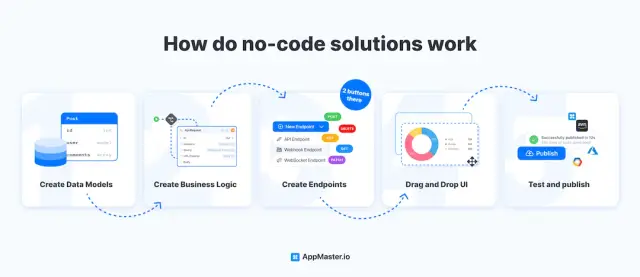
Some of the most important reasons why a business needs an app are:
- Business apps increase employee productivity by streamlining and streamlining business operations.
- Field employees are empowered by business software, which enables them to maintain contact with the office and get process updates in real-time.
- Customer involvement is increased via business software, which increases patronage and revenue.
- Business software that is supported by user-friendly analytics tools that assist provides actionable data to support the growth of your company via better business choices.
- Developing custom business apps has never been easier with the help of low-code/no-code development platforms. As a result, you don't have to go through the lengthy and expensive procedure of traditional development.
How to start an app development business?
Business app development can be a highly lucrative career as all types of large and small businesses need an app nowadays to fulfill their requirements and increase productivity. If you want to start an app development business, you have to develop a comprehensive plan by following these steps:
Requirements analysis
You may interview the important decision-makers and employees first, or you can perform surveys first. As a result, you'll better understand the custom software you truly need to expedite your business process.
Utilize the data you acquired to better comprehend the demands that are unique to your company. Next, use a mapping strategy to find fresh chances to enhance client interactions and business operations.
Define the scope of your business
Identify probable objectives that your future business software should be able to accomplish by having a brainstorming session. Do you want to use big data, for example, or do you want to boost productivity and efficiency? Outline the technical needs required to accomplish this set of strategic objectives. Consider the methods, development environment, and technology stack that will be utilized to execute each job.
Create Business Plan
Create a comprehensive business plan and conduct a financial analysis to determine the potential return you can achieve on your investment. The average cost of starting a business app development company can greatly vary on various factors such as:
- Primary and secondary development solutions in your business
- Software development infrastructure
- The number of team members
- Maintenance and support
- Training
A well-developed business plan is one that includes complete information about the resources required to start a business, the duration of the project, and details of the tools and technology you will be using to develop business apps.
Create and implement business strategy
Create a plan that will roll out your app's key features affordably. Determine which activities should be completed first and how long each step of the creation of your custom business software may take.
Ultimately, your goal should be to achieve the following key features to make your app development business a roaring success:
- Use automation tools as much as you can
- Assure of first-rate security at all times
- Ensure communication between the engineering and business departments
- Give the staff the greatest tools and establish the best business processes
- Establish reasonable deadlines and quality goals
- Keep track of all versions
- The final product's scalability should always be tested
- Collaborate with an established business or business team with appropriate software development expertise
Creating a business application development team
It would be best if you created a team to be in charge of the project's effective execution once you have produced a thorough plan and strategy. People from several firm departments that handle various tasks should be on your team. Such a team would be able to provide insightful definitions of the data that you should consider.
Representatives from each of your user groups should be on your project team. In your business, you'll need managers, field employees, end users, executives, operations personnel, and other crucial essential players.
Select the project team
The project team must document the business app requirements. Additionally, they will be in charge of soliciting user feedback, developing an ongoing training program for all staff employees, highlighting the advantages of the customized app to all of its business users, and recommending key features and enhancements.
Hire a system admin
The system administrator must configure your new business software. In addition to technology, a skilled administrator should have a thorough awareness of the business processes in your organization. They are also in charge of bringing out improvements in key features, connecting the new app with the existing business software systems, producing dashboards and reports, and transferring data from other systems. They implement suitable policies to ensure the feature stays connected per the app's overall vision.
Managers
Your business app's deployment strategy, needs for reports and dashboards, workflow rules, etc., will be handled by executives and managers.
End-users / clients
To ensure the new software is successfully adopted, business users of the new business app should be included in the installation process. You must offer them a chance to comment on the new system and provide suggestions for improvements. Additionally, you should take steps to ensure that all staff employees get the necessary training so they can utilize the new business software effectively.
Traditional app development vs. no-code development
Traditional app development involves a large developer team, is time-consuming, and is expensive. Outsourced app development usually produces unsatisfactory outcomes and might be more expensive to correct than to create.
Each program must be independently created for web browsers, tablets, and smartphones, which drives up costs and lowers efficiency, further complicating the situation. The no-code method of corporate app development may help to solve these problems. With low-code/ no-code app development tools, you can turn your best ideas into a reality.
Let's discuss the differences between traditional app development and no-code development in terms of different key features:
Cost
The cost of developing traditional or custom software might vary from $40,000 to $250,000 for the design and development of the application. The price is still quite high, even if it will vary depending on the project's scale and the particular demands of the business. Large enterprises that need highly specialized software, which is difficult to create using low-code/no-code solutions, often find this to be a worthwhile alternative.
Platforms with little or no-code development solutions are much less expensive than their conventional equivalents. This is largely due to the fact that no-code platforms only charge a corporation to use a certain service, not to construct it from scratch.
Coding skills
A range of tools and several features are often included in the conventional approach to app development, which aids developers in building very complex programs. One would need very technical and complex expertise in this industry to correctly use these apps.
On the other hand, the low-code/no-code platforms do not provide a large selection of tools and features. These platforms have easy-to-use drag-and-drop features to quickly and easily create a variety of apps by incorporating all of the key features. When employing the no-code strategy, app development becomes significantly simpler for non-technical workers that lack the necessary expertise.
Flexibility
Because they often feature a complex setup mechanism, traditional development platforms are less agile. Moreover, the proper operation of complicated codes takes a lot of time to understand in order to become a professional developer.
Due to its drag-and-drop capabilities, no-code platforms are far simpler to use and manage, in contrast. In addition, unlike custom app development, you do not need to write programs here in order to construct apps; instead, you may accomplish it by using sketching techniques.
Ease of Maintenance
Maintenance is a major pain point with conventional coding since upgrades or revisions need a specialized internal or external development team. Software revision is a laborious process requiring teams to plan, create, and test before informing business users of new changes.
In contrast, no-code platforms, which are SaaS (application platform as a service) platforms, are often managed and maintained by the platform's owner. Because the hosting firm handles all software upgrades and changes rather than the business subscribing to the service, maintenance is made easier.
This is particularly advantageous for companies with little to no IT support since it enables them to make use of well-maintained software without having to pay a third-party vendor or an internal staff.
Advantages of no-code development
No-code development is definitely a game changer when it comes to developing different types of apps, such as enterprise business apps, web applications, and many types of mobile apps.
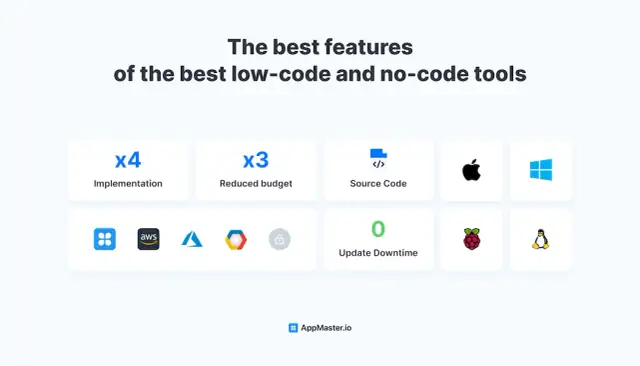
Following are the top 8 advantages of no-code development:
Quick and easy
No-code development moves much more quickly than conventional app development. A straightforward enterprise client application will only take some weeks, and a basic app will take a few hours. On the contrary, traditional development approaches require a lot of months and even a year for the complete development and implementation of an enterprise app. You can create custom enterprise solutions with no-code platforms. The speed of development with no-code development is about ten times quicker than with traditional development.
Furthermore, no-code tools like AppMaster is simple to use. You don't have to face any steep learning curve while using a tool like AppMaster. Anyone can use it, as no-code platforms are meant to level the playing field of application development.
The majority of the no-code platforms have reliable drag-and-drop capabilities that let you create any enterprise application without any coding knowledge and skills. Citizen developers can use the drag-and-drop features to build apps quickly and make the changes as necessary since everything is visible.
Updates
All types of programs and applications must be updated often to incorporate new functionalities and eliminate bugs and errors that might be present in the initial version of an app. Traditionally, this is an expensive and time-consuming procedure that sometimes necessitates users to shut down the program.
However, there are no limits to no-code tools. Businesses must be adaptable to the present business climate and market requirements. No-code platforms allow you to create and incorporate a new feature quickly and different types of modifications.
Better productivity
No-code platforms enable business, and IT teams to work together to address practical problems that have an effect on the organization. Business teams may create their own apps using this method without having to wait for engineers. Because there is no longer a need for complicated code, more team members have access to it, increasing productivity.
Business agility
Enterprises can adapt, react to market changes, and take advantage of new possibilities thanks to business agility. Leading businesses of today use cutting-edge, digital solutions like no-code and low-code technologies to achieve agility.
Enterprise firms can meet customer demand for more digital services and goods thanks to no-greater code's agility. The ability to deploy apps across a variety of platforms allows customers to engage with the business in the manner to which they are accustomed.
Modern development approach
No-code development is not a fad that will go away. Numerous no-code tools are being introduced in the market on a regular basis. Statistics also show that this type of app development will become a popular standard now that large and small businesses are discovering its benefits and simplicity.
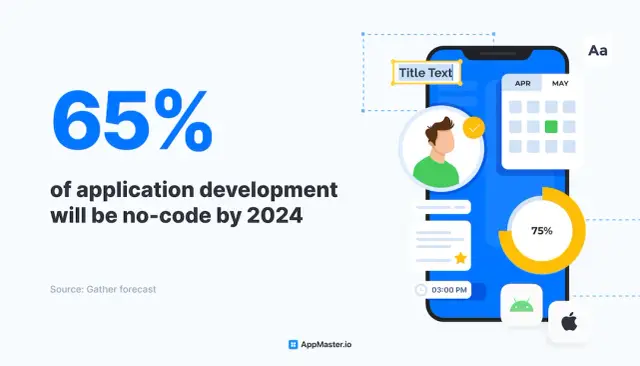
According to a Gartner survey, by 2024, 65% of large-scale companies and enterprises will be using at least four low-code no-code development tools. These companies will also be involved in citizen development projects.
Resources utilization
Anyone who lacks coding skills may create apps using no-code development tools. Business users that have first-hand knowledge of the problem may create their own apps. It helps businesses to develop solutions using their own internal resources without needing to bring in an outside contractor.
Great customer experience
No-code platforms make it simpler to accommodate the myriad of channels via which customers demand to communicate with companies today. This is known as multi-experience, and it is a key benefit of no-code.
Enterprises can now provide multichannel customer experiences that are on par with those of smaller, more agile companies that aren't constrained by bureaucracy and antiquated systems thanks to no-code technology.
Multi-experience development offers automated refactoring, pre-built templates, and basic chatbots. Customers may switch between several modes of engagement and interaction thanks to it without having to learn new procedures or repeat information. No code makes it simpler and quicker to provide customers with the best experience possible throughout every engagement.
Minimize total cost
No-code development approach reduces costs in many different ways. The cost of running and managing a business is already quite high, but you don't have to spend too much money on business app development. Instead, use a reliable no-code tool like AppMaster to minimize the total cost of your business software project.
Organizations may control ownership costs using no-code. It is a more affordable option than using conventional software development approaches. Developers with less expertise are needed, and business-side staff employees may contribute actively to the development process. Programs may be developed with input from the business side, which results in more often applications that closely match needs and thus reduce costs to produce an app.
Best no-code platform – AppMaster
The best and most popular option for a no-code app creation platform is AppMaster. Its robust user interface and backend, which generate the source code, provide the user the freedom to work. It offers a drag-and-drop interface that makes it quick to create an app that works as intended. AppMaster can help you in creating any form of app you choose. Moreover, the AppMaster platform has the ability to produce technical documentation similarly to how people do.
Because it is quicker, more versatile, and less expensive, it is really superior to the whole staff of developers. AppMaster can. It can produce 22,000 lines of code per second. This kind of quickness, efficiency, and high performance are not possible in a traditional development team.
Conclusion
Ultimately, every business wants to increase productivity and reduce costs. This kind of business goal can be achieved with the help of no-code development tools like AppMaster, through which you can build business apps efficiently, securely, and affordable manner.






